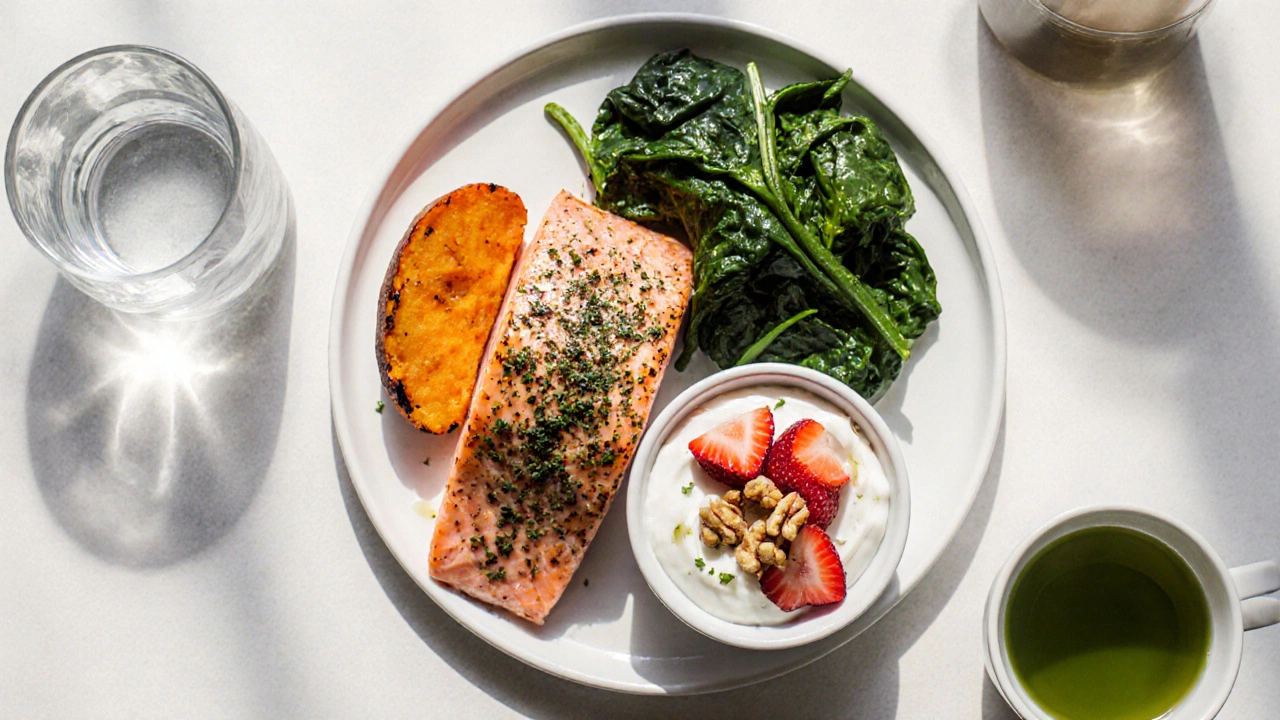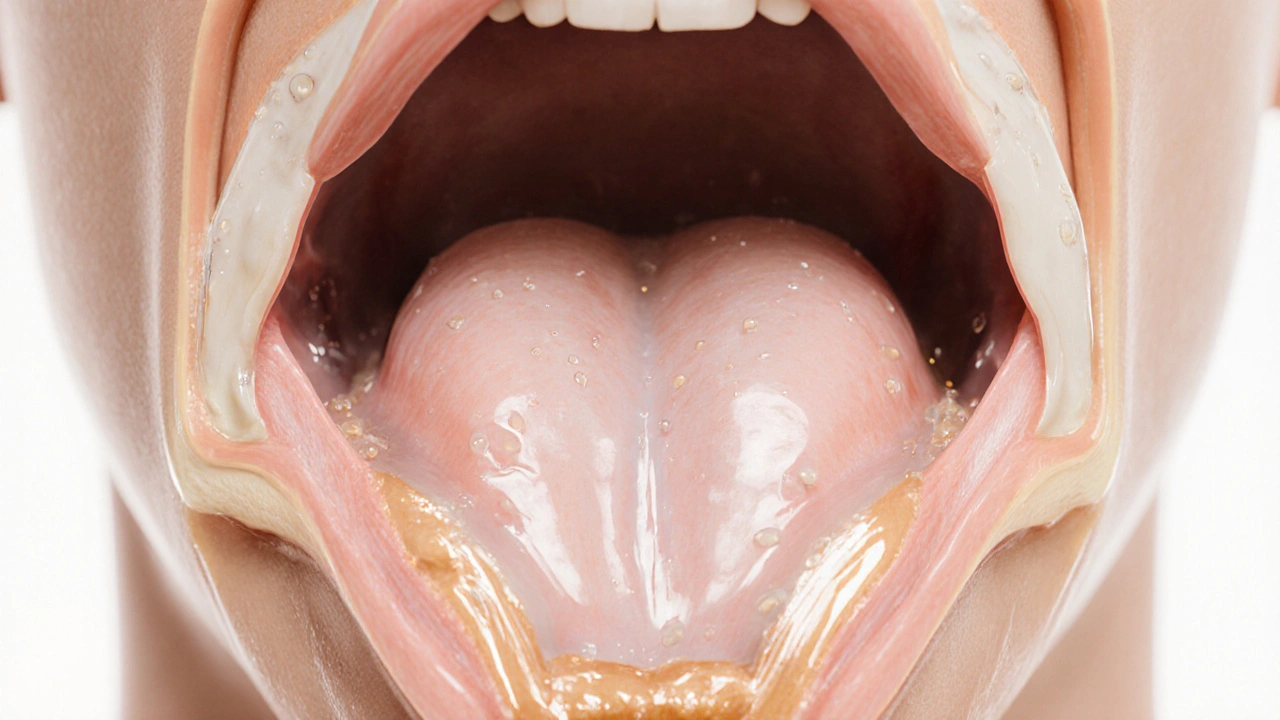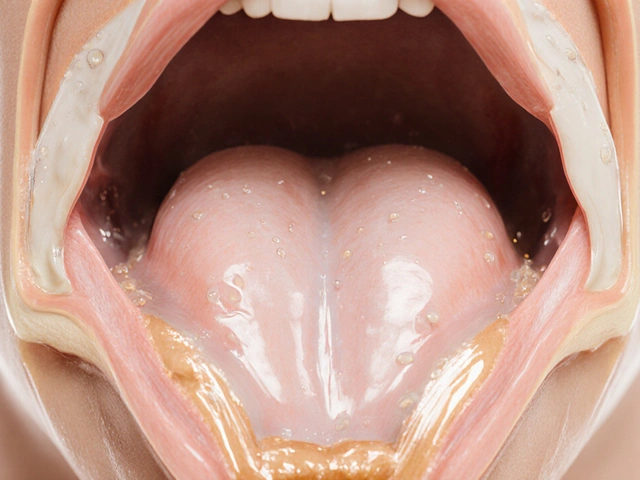Pharyngeal Health Nutrition Calculator
Enter your details and click "Calculate My Nutrient Needs" to see personalized recommendations for maintaining a healthy pharyngeal mucous membrane.
Vitamin A
Recommended: 700 µg (men) / 600 µg (women)
Vitamin C
Recommended: 90 mg (men) / 75 mg (women)
Zinc
Recommended: 11 mg (men) / 8 mg (women)
Omega-3
Recommended: 250–500 mg EPA+DHA daily
Probiotics
Recommended: 1–10 billion CFU daily
When we talk about the pharyngeal mucous membrane is the thin, mucus‑producing lining that coats the back of the throat and protects the airway from microbes and dryness, keeping it healthy means fewer sore throats, less irritation, and better overall immunity.
Key Takeaways
- Vitamin A, C, zinc, and omega‑3s are the nutritional powerhouses for throat lining health.
- Staying well‑hydrated and eating probiotic‑rich foods sustain mucus production.
- Avoid excessive spicy, acidic, or processed foods that can irritate the membrane.
- Plan meals around whole‑food sources to get a balanced mix of antioxidants and minerals.
- Simple lifestyle tweaks-like humidified air and gentle voice use-boost dietary benefits.
Understanding the Pharyngeal Mucous Membrane
The membrane does three jobs: it traps particles, secretes mucus to keep tissue moist, and signals the immune system when invaders arrive. If the lining becomes thin or dry, you’ll notice a scratchy throat, frequent infections, or a hoarse voice. Nutrition directly fuels the cells that produce mucus and the protective proteins that keep the tissue resilient.
Core Nutrients for Membrane Health
Below are the nutrients that research shows support the pharyngeal lining. Each one is introduced with a brief definition and the daily amount most adults need.
Vitamin A
Vitamin A is a fat‑soluble vitamin that maintains the integrity of mucosal surfaces and supports mucus‑secreting cells. Recommended intake: 700µg (men) / 600µg (women) per day. Good sources include liver, sweet potatoes, carrots, and dark leafy greens.
Vitamin C
Vitamin C is an antioxidant that promotes collagen formation, helping keep the throat lining elastic and resistant to damage. Recommended intake: 90mg (men) / 75mg (women). Citrus fruits, strawberries, bell peppers, and broccoli supply plenty.
Zinc
Zinc is a trace mineral involved in cell repair and immune signaling, both essential for a robust mucous membrane. Recommended intake: 11mg (men) / 8mg (women). Find it in oysters, beef, pumpkin seeds, and chickpeas.
Omega‑3 Fatty Acids
Omega‑3 fatty acids are essential polyunsaturated fats that reduce inflammation and improve the lipid layer of mucus. Aim for 250-500mg EPA+DHA daily. Fatty fish (salmon, mackerel), flaxseeds, and walnuts are top choices.
Hydration (Water)
Water is the most basic building block for mucus; adequate intake keeps the membrane moist and clears irritants. General guideline: about 2L for women, 2.5L for men, more if active or in dry climates.
Probiotics
Probiotics are live beneficial bacteria that balance the throat’s micro‑flora, indirectly supporting mucus quality. Aim for 1-10billion CFU daily from fermented foods like yogurt, kefir, sauerkraut, or a quality supplement.
Antioxidants
Antioxidants are compounds that neutralize free radicals, preventing oxidative damage to the mucous membrane. Sources include berries, green tea, dark chocolate, and spices such as turmeric.

Food Choices & Meal Planning
Putting these nutrients together on your plate is easier than you think. The table below lists common foods, the key nutrient they provide, and a quick serving tip.
| Food | Primary Nutrient | Typical Serving | Tip |
|---|---|---|---|
| Sweet potato (baked) | Vitamin A | 1 medium (150g) | Top with a drizzle of olive oil for extra healthy fat. |
| Orange or grapefruit | Vitamin C | 1 fruit (130g) | Eat whole; juice strips away fiber. |
| Oysters (cooked) | Zinc | 6 medium (85g) | Pair with a squeeze of lemon for flavor. |
| Salmon (grilled) | Omega‑3 | 100g fillet | Season with herbs, avoid heavy sauces. |
| Greek yogurt (plain) | Probiotics | 1 cup (200g) | Add fresh berries for extra antioxidants. |
| Spinach (steamed) | Vitamin A & C | ½ cup (90g) | Mix into soups for gentle texture. |
| Walnuts | Omega‑3 | ¼ cup (30g) | Snack raw; avoid salted versions. |
| Green tea | Antioxidants | 1 cup (240ml) | Steep 2‑3min; no added sugar. |
Putting It All Together: The pharyngeal health diet
Design your meals around a "protein‑vegetable‑healthy‑fat" pattern. A typical breakfast might be Greek yogurt topped with berries and a sprinkle of ground flaxseed; lunch could be a salmon salad with mixed greens, orange slices, and a drizzle of olive oil; dinner may feature baked sweet potato, steamed spinach, and a side of oyster broth.
Whenever possible, choose fresh over processed. Processed meats, high‑salt snacks, and sugary drinks dry out the mucous membrane and increase inflammation.
Lifestyle Tips Beyond Diet
- Humidify indoor air during winter; a 30‑40% humidity level keeps mucus from evaporating.
- Limit caffeine and alcohol, as they have diuretic effects that can thin mucus.
- Avoid smoking and second‑hand smoke-both directly damage the throat lining.
- Practice gentle voice use; shouting or prolonged speaking can strain the membrane.

Sample 7‑Day Meal Plan
- Day 1: Breakfast - Greek yogurt with strawberries and walnuts; Lunch - Quinoa salad with grilled salmon, avocado, and orange segments; Dinner - Sweet potato mash, steamed broccoli, and a mug of green tea.
- Day 2: Breakfast - Oatmeal topped with flaxseed and blueberries; Lunch - Lentil soup with spinach and a side of whole‑grain toast; Dinner - Baked cod, roasted carrots, and a glass of kefir.
- Day 3: Breakfast - Smoothie (spinach, banana, orange juice, and a scoop of probiotic powder); Lunch - Turkey wrap with mixed greens and a drizzle of olive oil; Dinner - Stir‑fried tofu, bell peppers, and brown rice.
- Day 4: Breakfast - Scrambled eggs with smoked salmon and chives; Lunch - Chickpea salad with cucumber, tomato, and lemon dressing; Dinner - Grilled chicken breast, sweet potato wedges, and steamed green beans.
- Day 5: Breakfast - Cottage cheese with pineapple chunks; Lunch - Sardine salad on rye bread, side of carrot sticks; Dinner - Mushroom risotto with a cup of herbal tea.
- Day 6: Breakfast - Avocado toast topped with a poached egg; Lunch - Beef and vegetable stew (includes carrots, celery, and barley); Dinner - Baked trout, quinoa, and a mixed berry compote.
- Day 7: Breakfast - Chia pudding made with almond milk and topped with kiwi; Lunch - Spinach and feta frittata, side of orange slices; Dinner - Roast pork tenderloin, roasted parsnips, and a cup of green tea.
These meals keep the key nutrients flowing while providing variety to prevent boredom.
Common Pitfalls & How to Avoid Them
- Relying on supplements alone - Whole foods deliver synergistic compounds that isolates can’t match.
- Skipping water - Even if you eat watery fruits, you still need plain fluid.
- Over‑consuming spicy or acidic foods - They can irritate an already sensitive membrane.
- Neglecting fiber - Low fiber can lead to gut imbalance, which indirectly affects throat health.
Frequently Asked Questions
Can vitamin C really help with a sore throat?
Yes. Vitamin C supports collagen production, which keeps the throat lining flexible and speeds up repair. Studies show that regular intake reduces the duration of mild viral throat infections.
How much water should I drink to keep my pharyngeal membrane moist?
Aim for at least 2L (about 8 cups) a day, more if you’re active, live in a dry climate, or drink caffeine. Sip regularly rather than gulping large amounts at once.
Are probiotic supplements necessary if I eat fermented foods?
If you regularly enjoy yogurt, kefir, sauerkraut, or kimchi, you’re already getting a solid dose of good bacteria. Supplements can help during a course of antibiotics or when you’re traveling and can’t access fresh fermented foods.
Does caffeine dry out my throat?
Caffeine has a mild diuretic effect, which can reduce overall hydration and thin mucus. Moderation is fine, but pair coffee or tea with a glass of water to offset the effect.
What’s the best time of day to eat omega‑3 rich foods?
There’s no strict timing, but consuming omega‑3s with some fat (like olive oil or avocado) improves absorption. Many people find it convenient to add fish to dinner, when the body’s digestive enzymes are most active.







Alison Poteracke
October 10, 2025 AT 14:04Great reminder to keep the water bottle handy – staying hydrated is the simplest way to protect your throat lining. Even a quick sip every hour can make a big difference.
Marianne Wilson
October 11, 2025 AT 09:31Sure, the article loves kale and salmon, but it conveniently glosses over the fact that many people can’t afford fresh produce every day. A diet plan should consider socioeconomic reality, not just idealistic food pyramids.
Patricia Bokern
October 12, 2025 AT 04:58Listen up, folks! If you keep dousing your meals in hot sauce and processed snacks, you’re basically signing a death warrant for your throat. Those chemicals will scream at you like a night‑time conspiracy, and your pharynx will thank you when you finally cut the nonsense.
Garrett Gonzales
October 13, 2025 AT 00:24From a clinical nutrition standpoint, the pharyngeal mucosa operates as part of the mucosal‑associated lymphoid tissue (MALT), requiring a steady supply of micronutrients to sustain goblet cell turnover and epithelial integrity.
Vitamin A, as retinol, modulates gene expression for mucin production, while vitamin C serves as a co‑factor for prolyl hydroxylase in collagen synthesis, directly influencing tissue elasticity.
Zinc acts as a catalytic ion for DNA polymerase and RNA transcription factors, which are essential for rapid epithelial restitution after mechanical stress.
Omega‑3 long‑chain polyunsaturated fatty acids (EPA/DHA) incorporate into phospholipid bilayers, reducing pro‑inflammatory eicosanoid synthesis and thereby limiting cytokine‑mediated mucosal edema.
Hydration status, quantified by serum osmolality, dictates the rheology of mucus; hypo‑osmolar states increase viscoelasticity, impairing mucociliary clearance.
Probiotic strains such as Lactobacillus rhamnosus GG augment the local microbiome, competitively inhibiting pathogenic colonization and modulating Toll‑like receptor pathways.
Empirical evidence from randomized controlled trials suggests that a combined regimen of 700 µg retinol, 90 mg ascorbate, 11 mg zinc, and 250‑500 mg EPA/DHA daily reduces incidence of acute pharyngitis by approximately 30 % in adult cohorts.
Practical implementation involves integrating retinol‑rich foods (e.g., orange‑fleshed sweet potatoes), citrus or bell‑pepper sources of ascorbate, zinc‑dense shellfish or legumes, and fatty fish or algal oil supplements into each main meal.
For individuals with limited access to fresh produce, fortified cereals or multivitamin complexes can bridge the gap, though bioavailability may vary.
Timing of omega‑3 ingestion alongside dietary fat enhances micelle formation in the duodenum, optimizing absorption via chylomicron transport.
Moreover, splitting water intake into 250 mL increments every 30 minutes sustains mucosal hydration more effectively than episodic large volumes.
It is also advisable to limit diuretic agents-caffeine, high‑sodium foods, and excessive alcohol-as they exacerbate transepithelial fluid loss.
Finally, a synergistic lifestyle approach-humidified indoor air, voice conservation, and avoidance of irritants like tobacco-magnifies the nutritional benefits and preserves pharyngeal health over the long term.
Aman Deep
October 13, 2025 AT 19:51🌀 Imagine your throat as a sacred garden; each bite you take is a seed you plant. 🌱 Sweet potatoes whisper stories of beta‑carotene, while fermented kimchi chants probiotic hymns. 🍣 A splash of omega‑rich salmon oil glistens like sunrise on calm waters, and water becomes the gentle rain that keeps the blossoms from wilting. The universe loves balance, so let your plate be a poem of colors and flavors. 🎨✨
Herman Bambang Suherman
October 14, 2025 AT 15:18Drink enough water, add a fruit serving, and you’re set for the day. Simple, effective, no drama.
Meredith Blazevich
October 15, 2025 AT 10:44I love how this guide turns a boring nutrient list into a story you can actually follow. Picture yourself sipping warm tea while the antioxidants dance in your throat, protecting you from that scratchy feeling. It’s both practical and inspiring, and that’s exactly the boost we all need.
Nicola Gilmour
October 16, 2025 AT 06:11Start your morning with a quick Greek yogurt bowl and watch how steady energy carries you through the day. Little habits add up, and your throat will thank you.
Darci Gonzalez
October 17, 2025 AT 01:38Great tips! Adding a handful of berries to your oatmeal not only boosts antioxidants but also makes breakfast feel like a treat 😊 Keep it up!
Marcus Edström
October 17, 2025 AT 21:04People need to stop treating nutrition like an afterthought. If you want a resilient throat, make these foods a non‑negotiable part of every meal.
Val Vaden
October 18, 2025 AT 16:31I could eat this forever.
lalitha vadlamani
October 19, 2025 AT 11:58While the recommendations are scientifically sound, it is morally imperative to acknowledge that the promotion of certain “superfoods” often masks corporate interests. The glorification of salmon, for instance, can encourage unsustainable fishing practices, which contradicts the ethical consumption we should strive for.
Landmark Apostolic Church
October 20, 2025 AT 07:24Think of the throat as a contemplative river: flow is essential, and the nutrients you feed it are the stones that shape its course. Too many processed chemicals act like boulders, disrupting the gentle current. Simplicity in diet restores the natural rhythm.
Matthew Moss
October 21, 2025 AT 02:51Honestly, this “balanced diet” rhetoric is nothing but a liberal façade. Real American strength comes from hearty, unprocessed meat and plain water. Stop pandering to trendy health fads.
Antonio Estrada
October 21, 2025 AT 22:18From a precision standpoint, the recommended servings align with the Recommended Dietary Allowances (RDAs) set by the Institute of Medicine. Ensuring intake within these thresholds optimizes mucosal defense without risking hypervitaminosis.
Andy Jones
October 22, 2025 AT 17:44Oh wow, another “miracle” list of foods. As if carrots will magically cure a sore throat. Maybe next you’ll tell us that breathing air works too. 🙄
Kevin Huckaby
October 23, 2025 AT 13:11Why settle for boring pumpkin? Spice it up with turmeric and ginger – they’re the real heroes 🌟. Plus, emojis make everything better 😂.
Brandon McInnis
October 24, 2025 AT 08:38Really appreciate the thoroughness here – it’s like a roadmap for keeping our throats happy. The balance of science and practical tips is just spot‑on.
Aaron Miller
October 25, 2025 AT 04:04One must question the elitist presumption that only “premium” foods can preserve pharyngeal health. Yet, the evidence is unequivocal: the right micronutrients, regardless of their market price, are the true arbiters of mucosal resilience.
Roshin Ramakrishnan
October 25, 2025 AT 23:31Excellent overview, Dr. Gonzales! Adding that a mid‑day probiotic smoothie can synergize with the listed nutrients really ties the plan together. Keep the community informed.